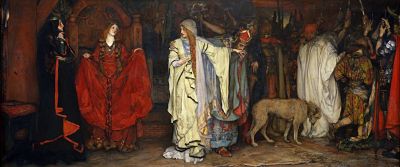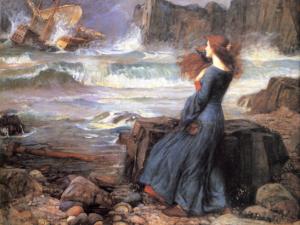 If you were in King Lear’s family, the play is a tragedy. If you were the average Englishman, then the play is a miracle of divine goodness. Seeing this goes a long way to answering one worry some have about God, evil, and God’s goodness.
If you were in King Lear’s family, the play is a tragedy. If you were the average Englishman, then the play is a miracle of divine goodness. Seeing this goes a long way to answering one worry some have about God, evil, and God’s goodness.
Seeing God’s plan in action in a short period of time (a decade) is impossible. The world and His will are too complex. To cite just one problem: God wants maximum human freedom with maximum human flourishing in a broken world. He is healing the world, allowing for our freedom, and bringing an end to history soon (as God counts soon). All the factors count: the fall of a sparrow, a hurricane in the Gulf, a crooked politician in Bolivia, a winning goal by a young girl in an elementary school in Mexico, and the billions of other events of this year . . . matter.
A man must look at centuries to see the hand of God and even then, until the very end, we cannot be sure of His purpose.
If one cannot see the plan in the entire Earth over a decade, how much more difficult is it to see what God has wrought in one family over a shorter period of time? King Lear was a fool and his folly left England in peril. He divided his kingdom between two daughters and left his most capable heir a power in France. Meanwhile, the King partied his way across the nation with a compact fighting force of loyal knights. If you were betting, you would have bet on endless civil war, invasion and conquest by France, and dire ruin for England.
Read the play. Shakespeare rewrites the traditional tale to make things worse for the nobility and the Lear family, but better for England. The civil war is called off by a French invasion before it can do much harm. The invasion from France is led by the noble and brilliant Cordelia, but is defeated. This leaves England free of foreign rule, however, the victory was hard won. Beating Cordelia and the French radically disrupted the established nobility, leaving the worst dead, and the best in charge. As a result, England emerges from a single battle unified, with good leaders, and at peace.
England is saved from Lear by Lear’s fall.
Americans should stop and reflect. We pray for peace in our time, but we do not wish a total peace that allows great evil to fester so that when it does break out, the cure kills the patient. King Lear paraphrases the Bible: better a ruling class to die than a nation. We have been in this place before now. After the Revolutionary War, the heroes went home, but the money grubbers and politicians stayed. At the state and continental level, they were soon bankrupting the nation and bringing on worse than the Revolutionary War, a civil war. The turmoil of the decade after the Revolutionary War would wipe out that class of leaders, along with a great deal of wealth. Things were very bad, but they got so bad that the Great Man, George Washington, decided to come out of retirement and preside over a constitutional convention.
If America were to disappear tomorrow, the Constitution of 1789, the work of that convention, would be a wonder and gift to history. Looked out in microcosm, the time period from the end of the Revolution through 1789 was a time of peril and pain. Many a Lear, fools who speculated in paper money or debt, ended up in trouble. These were real tragedies, but Yankee Doodle survived.
We had our own King Lear moment, a time where the King is dead, but John Bull, the average Englishman, thrives. . . all was well that ended well. For the United States we can pray that once again things turn out well for “We the People” even if the political class faces extinction. For that we will need a Washington: a disinterested man, first in war, first in peace, first in the hearts of his countryman.
——————————————–
William Shakespeare went to God four hundred years ago. To recollect his death, I am writing a personal reflection on a few of his plays. The Winter’s Tale started things off, followed by As You Like It. Romeo and Juliet still matter, Lady Macbeth rebukes the lust for power, and Henry V is a hero. Richard II shows us not to presume on the grace of God or rebel against authority too easily. Coriolanus reminds us that our leaders need integrity and humility. Our life can be joyful if we realize that it is, at best, A Comedy of Errors. Hamlet needs to know himself better and talks to himself less. He is stuck with himself so he had better make his peace with God quickly and should stay far away from Ophelia. Shakespeare gets something wrong in Merchant of Venice . . . though not as badly as some in the English Labour Party or in my Twitter feed. Love if blind, but intellectualism is blind and impotent in Love’s Labours Lost. Brutus kills Caesar, but is overshadowed by him in Julius Caesar. We should learn not to make Much Ado about Nothing. We might all be Antony, but if we would avoid his fate then we must avoid flattery and the superficial love of Troilus and Cressida. We are fools, but our goal should be to accept it and not to degenerate into Biblical fools during our Midsummer Night’s Dream. Richard III is a symptom of a bad leadership community, but be careful that use Measure for Measure to guide your reaction to the mess. The modern university is Iago in Othello playing on our sins to destroy the nation. You can’t accumulate your way to a great leader and personal piety in Henry VI (Part I) is not enough to make a great king. God will save the King, not our stupid partisan squabbles seen in Henry VI (Part 2) and not kingmakers as existed in Henry VI (Part 3). Fortunately, in God’s world All’s Well That Ends Well. Two Gentlemen remind me that being in love is grand. King John keeps winning and so loses. Slander always gives way to truth in Cymbeline. We need patrons, but God help us if we flatter them and lose them as Athens did with Timon of Athens. We need good leaders and not have to hope against reason that one turns out well like young Prince Hal in Henry IV Part One. Being powerful is all fun and games, until it isn’t as Henry learns in Henry IV Part Two. Virtue can be jolly and edgy, as The Merry Wives of Windsor show. We can all be shrews and need The Taming of the Shrew. Pericles did not live in a Zootopia, his world was more realistic. No revenge lest we end like Titus Andronicus. Shakespeare shows what the fusion of Christianity and classicism did for all of us in Venus and Adonis. It is hard to be delivered from evil, if we pursue it as did the evil man in The Rape of Lucrece. God save us from the leader like King Lear who rules by tricks and fear, though God will make things the best they can be.
















